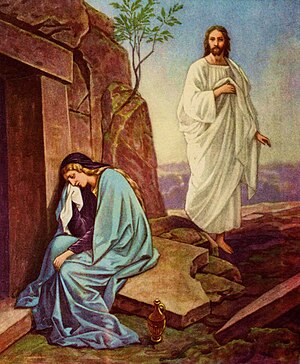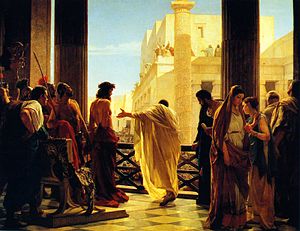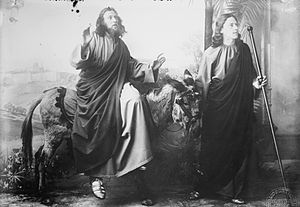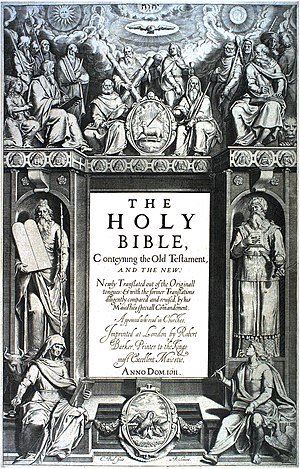 Image via WikipediaBEHOLD THE LAMB OF GOD
An Easter Series -- Part 5 of 7
Introduction -- Clamor for Crucifixion
Image via WikipediaBEHOLD THE LAMB OF GOD
An Easter Series -- Part 5 of 7
Introduction -- Clamor for Crucifixion
A. The religious officials persuaded the crowd to demand the release of Barabbas instead of Jesus.
B. The were manipulated, but they allowed themselves to be manipulated.
C. Pontius Pilate, the Roman procurator, after ceremoniously washing his hands said, “I am innocent of this Man’s blood,” (Matthew 27:24) Of course, he wasn’t.
D. “And all the people answered and said, His blood be on us and on our children.’” (Matthew 27:25)
E. “Then he released Barabbas for them; but after having Jesus scourged, he delivered Him to be crucified.” (Matthew 27:26)
I. Jesus Crucified
A. Mockery, Humiliation, and Beating
Scourged = flogged with a leather whip containing bits of bone or metal imbedded in its thongs (“cat o’ nine tails”). Used by the Romans on murderers and traitors.
He was beaten and spat upon by the soldiers.
They dressed Him in a purple robe and placed a crown of thorns on His head. [“I thank Thee for wearing the thorns on Thy brow, If ever I loved Thee, my Jesus, ’tis now.”*] (See John 19:1-6)
“Jesus therefore came out, wearing the crown of thorns and the purple robe. And Pilate said, ‘Behold the Man!’ When therefore the chief priests and the officers saw Him, they cried out, saying, ‘Crucify, crucify!’ Pilate said to them, ‘Take Him yourselves, and crucify Him, for I find no guilt in Him.’”(John 19:5-6)
B. On the Way to Golgotha
He carried His cross. When He could no longer carry it, a man from Cyrene (North Africa), named Simon, was compelled to carry it.
C. Jesus on the Cross -- Words** and Events at the Cross
1.
“Father, forgive them, for they do not know what they are doing.” (Luke 23:34)
2. They gave Him wine mixed with gall, but He was unwilling to drink it.
3. He made provision for His mother.
“…Woman, behold your son!” (John 19:26)
“…Behold your mother!..” (John 19:27)
4. The sign above his head” THIS IS JESUS THE KING OF THE JEWS (written in Hebrew, Greek, and Latin -- John 19:20)
5. Two robbers were crucified with Him, one on either side. (see Isaiah 53:12) One asks Jesus to remember him in His kingdom. “And He said to him,
‘Truly I say to you, today you shall be with Me in Paradise.” (Luke 23:43)
6. More abuse from the crowd, chief priests, scribes and elders, and the robbers. “He trusts in God; Let Him deliver Him now, if He takes pleasure in Him, for He said, ‘I am the Son of God.’” (Matthew 27:43, referring to Psalm 22:8)
“If you are the Son of God …” -- same words Satan used in Jesus’ temptation.
7. The cry of dereliction:
“My God, My God, why hast thou forsaken Me?” (Matthew 27:46, quoting from Psalm 22:1) “This cry may reflect the desertion Jesus felt as He was bearing the sins of the world.” (Charles C. Ryrie)
8.
“I am thirsty.” (John 19:28) He was given a drink from a sponge filled with sour wine.
9. He cried out,
“It is finished!” (John 19:30)
10. “And Jesus, crying out with a loud voice said,
“Father, into Thy hands, I commit My spirit,” And having said this, He breathed His last.” (Luke 23:46) (See Psalm 31:5).
11. The soldiers did not break His legs because He was already dead. (“not a bone of Him shall be broken,” (Psalm 34:20, quoted at John 19:36))
12. “…but one of the soldiers pierced His side with a spear, and immediately, there came out blood and water.” (John 19:34) “…They shall look upon Him whom they pierced.” (John 19:37, quoting Zechariah 12:10)
D. Other Events
1. They divided His garments and cast lots for His seamless tunic. (John 19:23-24, Psalm 22:18)
2. Three hours of darkness. Just as His birth had been an occasion for special light, His death was an occasion for special darkness. (Matthew 27:45)
3. “And behold, the veil of the temple was torn in two from top to bottom, and the earth shook; and the rocks were split…” (Matthew 27:51)
4. “and the tombs were opened, and many bodies of the saints who had fallen asleep were raised; and coming out of the tombs after His resurrection they entered the holy city and appeared to many.” (Matthew 27:52-53)
5. The centurion and his men were frightened by the earthquake and other events, and the centurion said, “Truly this was the Son of God!” (Matthew 27:54)
6. The body of Jesus was claimed and buried by Joseph of Arimathea, a rich man who had become a disciple of Jesus. (Matthew 27:57-60. See Isaiah 53:9)
II. The Meaning of the Death of Jesus
A. His death fulfilled God’s plan from eternity past. “ … the Lamb slain from the foundation of the world.” (Revelation 13:8, KJV)
B. Jesus went to the cross voluntarily. (John 10:18)
C. The suffering Jesus endured is described as follows by Bill Lobbs:
I suggest to you that it was knowing that this was what awaited him on the cross (the loss of the Father’s presence) that prompted Jesus to ask the Father three times in Gethsemane’s Garden, “If it be possible, let this cup be taken from me.” I don’t believe Jesus feared the beatings he would suffer. He wasn’t afraid of scourging whip that would soon cut across his back. He wasn’t trying to avoid the pain of the nails that would pierce his hands and feet, nor the crown of thorns on his head. It was none of these things that caused Jesus to cry out to the Father. It was knowing that on the cross he would have to take our God forsakenness upon himself. The ultimate penalty is to be “God forsaken,” Jesus suffered this when he became the sin offering for the world. He suffered the most agonizing sorrow and pain anyone could ever suffer.
D. He Died as Our Substitute.
“For he hath made him to be sin for us, who knew no sin, that we might be made the righteousness of God in him.” (2 Corinthians 5:21,
KJV)
E. His Cross Was a Victory over Satan, Sin, and Death.
F. The Cross Was the Message of Early Preaching.
“The preaching of the cross is to them that perish foolishness; but unto us which are saved, it is the power of God.”(I Corinthians 1:18, KJV)
G. God Used the Murder of His Own Son as the Payment for All Sin of Those Who Would Believe.
His righteousness demands punishment for sin, and this was fulfilled at the cross. The death of Jesus is the full, final, and only payment for your sin.
H. The Cross Shows the Greatness of God’s Love for Us.
God has always shown His love and great patience, but the cross is the greatest expression of them.
I. Christ Is Our Example of Patience in Suffering.
In I Peter, the Apostle exhorts his readers to bear patiently with suffering, pointing to Christ as the great Example:
… since Christ also suffered for you, leaving you an example to follow in His steps, who committed no sin, neither was any deceit found in His mouth, and while being reviled, He did not revile in return; while suffering, He uttered no threats, but kept entrusting Himself to Him who judges righteously; and He Himself bore our sins in His body on the cross, that we might die to sin and live to righteousness; for by His wounds, you were healed. (I Peter 2:21-24. Also see Isaiah 53:9)
J. The Resurrection
Jesus didn’t stay on the cross. He didn’t stay in the tomb. He was raised from the dead. He is the Son of God. His Sacrifice was accepted in behalf of all believers. Because He rose again, we can also. His resurrection is the pattern for our own. (See I Corinthians 15)
K. He Ascended and Is at the Right Hand of the Father, Interceding for Us.
He is preparing a place for us. He sends His Holy Spirit. He is the Head of the Church.
Conclusion: Christ’s Work Demands a Response -- a Decision.
A. Make the decision God wants you to make.
1. To receive, through faith, Jesus Christ as your Lord and Savior, on the basis of His death, burial, and resurrection.
2. If you have already received Him, be strengthened and encouraged in you faith.
B. Failure to make a decision is actually a decision.
C. Time for deciding to receive Christ in very limited.
Direct Scripture quotations are from the
New American Standard Bible, except as otherwise noted.
*From the hymn, “My Jesus, I Love Thee,” words by William R. Featherston (1846-1873)
**Order of Jesus’ sayings based on A.T. Robertson,
A Harmony of the Gospels, Harper and Row, pp. 228-234.
Illustration: Jesus helped by Simon of Cyrene, part of a series depicting the stations of the Cross. Unknown painter, 19th century.
 Image via WikipediaBEHOLD THE LAMB OF GOD
Image via WikipediaBEHOLD THE LAMB OF GOD



















